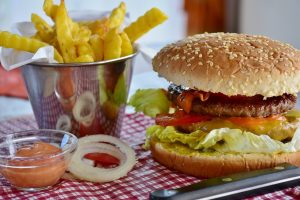If you are following the Keto Diet, you probably have come across the “dirty keto diet”. What makes it “dirty”?
Let’s start by talking about what the clean and dirty keto diet have in common.
Both clean and dirty keto diets are very low carb, high fat diets. High carb foods such as grains, rice, potatoes, pastries, bread, pasta, and most fruits, are severely restricted or banned. A total carb intake of no more than 50 grams per day, along with a moderate protein intake of 15–20% of daily calories, and a high fat intake of at least 75% of daily calories are the basis of the diets.
Simultaneously, the diets are significantly different. The clean keto diet focuses on whole, nutrient-dense foods from quality sources such as grass-fed beef, free-range eggs, wild-caught seafood, olive oil, and non-starchy vegetables. Clean keto also minimizes the intake of processed food, though it can still be eaten in moderation.
Dirty keto relies on highly processed and packaged foods (e.g. a double bacon cheeseburger without the bun from a fast food place). Processed foods are likely to have more additives, a high sodium content, and fewer micronutrients (vitamins and minerals like calcium, magnesium, zinc, folic acid, and vitamins C, D, and K) than the body needs.
Here are a few examples of scrumptious foods to eat on this diet:
- High fat protein sources: grass-fed beef, chicken thighs, salmon, tuna, shellfish, eggs, bacon (in moderation), full fat Greek yogurt, and cottage cheese
- Low carb vegetables: cabbage, broccoli, asparagus, Brussels sprouts, spinach, kale, green beans, peppers, zucchini, cauliflower, and celery
- Limited portions of berries: strawberries, blueberries, and blackberries
- Fat sources: grass-fed butter, ghee, avocados, coconut oil, MCT oil, olive oil, sesame oil, and walnut oil
- Nuts, nut butters, and seeds: walnuts, pecans, almonds, and hazelnuts, as well as hemp, flax, sunflower, chia, and pumpkin seeds
- Cheeses (in moderation): Cheddar, cream cheese, gouda, swiss, blue cheese, and manchego
- Beverages: water, sparkling water, diet soda, green tea, black tea, coffee, protein shakes, milk alternatives, vegetable juice, and kombucha

